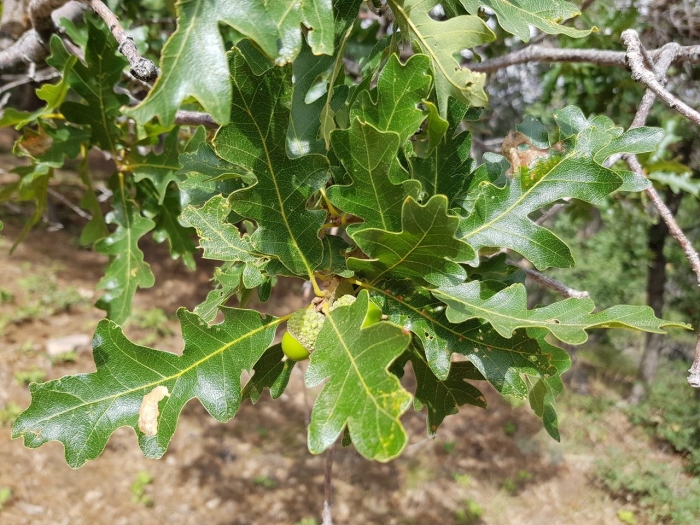Gambel Oak
(Quercus gambelii)
Gambel Oak (Quercus gambelii)
/
/

Kampf Robert
CC BY-SA 4.0
Image By:
Kampf Robert
Recorded By:
Copyright:
CC BY-SA 4.0
Copyright Notice:
Photo by: Kampf Robert | License Type: CC BY-SA 4.0 | License URL: https://creativecommons.org/licenses/by-sa/4.0/ | Attribution: Kampf Robert (cc-by-sa) | Rights Holder: Kampf Robert | Publisher: PlantNet | Date Created: 2019-09-05T14:03:48Z | Title: Quercus gambelii Nutt.: leaf | Notes: |











































































Estimated Native Range
Summary
Quercus gambelii, commonly known as Gambel Oak, is a deciduous shrub or small tree native to the rocky slopes and canyons of the Intermountain West and Northern Mexico, particularly within the chaparral, piñon-juniper woodlands, and montane forests. It exhibits significant size variation across its range, with mature heights ranging from 3–9 meters (10–30 feet). Dwarf forms under 1 meter (3+1⁄4 feet) tall are found in areas with heavy browsing or less favorable growing conditions. The largest specimens, which benefit from the additional moisture found along streams, can be quite impressive. Gambel Oak is known for its hard, dense wood and irregular, crooked branches that are flexible enough to withstand heavy snow loads. The foliage turns a striking orange and yellow in autumn, contributing to the vivid fall colors of its native landscapes. The inconspicuous unisexual catkins appear in spring, followed by acorns that are 10–20 millimeters (3⁄8–3⁄4 inch) long, maturing in September to a golden brown hue.
Gambel Oak is valued for its drought tolerance, making it suitable for xeriscaping and naturalistic plantings in arid regions. It is also used for erosion control and as a wildlife habitat, providing food and shelter for various species. In cultivation, it thrives in full sun and requires minimal water once established, preferring well-drained soils. While it reproduces by acorns, it also vigorously spreads from root sprouts, which can be a consideration for gardeners managing space.CC BY-SA 4.0
Gambel Oak is valued for its drought tolerance, making it suitable for xeriscaping and naturalistic plantings in arid regions. It is also used for erosion control and as a wildlife habitat, providing food and shelter for various species. In cultivation, it thrives in full sun and requires minimal water once established, preferring well-drained soils. While it reproduces by acorns, it also vigorously spreads from root sprouts, which can be a consideration for gardeners managing space.CC BY-SA 4.0
Plant Description
- Plant Type: Tree
- Height: 17-25 feet
- Width: 10-20 feet
- Growth Rate: Slow
- Flower Color: N/A
- Flowering Season: Spring
- Leaf Retention: Deciduous
Growth Requirements
- Sun: Full Sun
- Water: Low
- Drainage: Fast, Medium
Common Uses
Bee Garden, Bird Garden, Butterfly Garden, Erosion Control, Fire Resistant, Low Maintenance, Rabbit Resistant, Street Planting
Natural Habitat
Rocky slopes and canyons of the Intermountain West and Northern Mexico, particularly within chaparral, piñon-juniper woodlands, and montane forests
Other Names
Common Names:
Scientific Names: Quercus gambelii , Quercus gambelii var. gambelii , Quercus utahensis , Quercus leptophylla , Quercus albifolia , Quercus nitescens , Quercus confusa , Quercus novomexicana , Quercus submollis , Quercus gunnisonii
GBIF Accepted Name: Quercus gambelii Nutt.